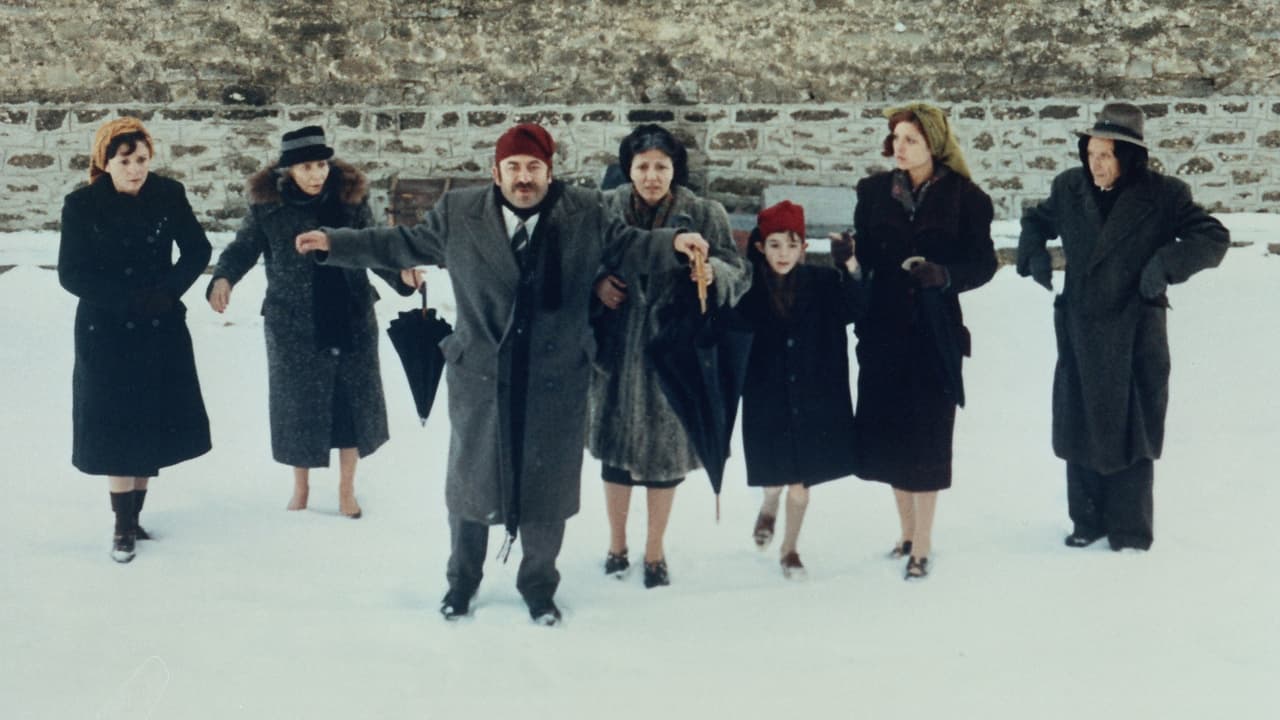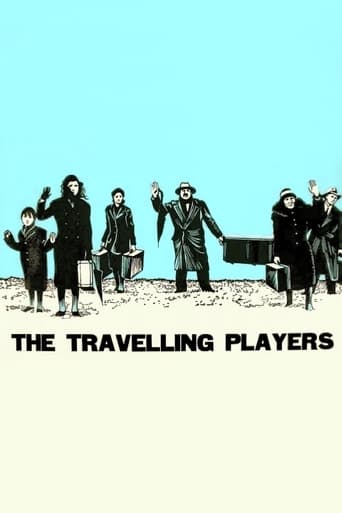

Best movie ever!
... View MoreOne of those movie experiences that is so good it makes you realize you've been grading everything else on a curve.
... View MoreA film of deceptively outspoken contemporary relevance, this is cinema at its most alert, alarming and alive.
... View MoreIt is encouraging that the film ends so strongly.Otherwise, it wouldn't have been a particularly memorable film
... View MoreThe Travelling Players is possibly the greatest movie in the history of Greek cinema. It is directed by the world-renowned Greek director Theo Angelopoulos and it presents the life in Greece from 1939 to 1952 through a family of travelling provincial players. It explores the political history of Greece during a very dramatic period, that includes dictatorship, the WWII outbreak, the Italian invasion and the subsequent German occupation and it continues with the liberation of the country and the very bloody Civil War. The Travelling Players was a very controversial movie. The film was to participate officially in the Cannes Film Festival, but the conservative Greek government, sought (and failed) to prevent this to happen, because the film tells the modern Greek history through a left- Marxist perspective.Angelopoulos proves that he's a master filmmaker on every level. From direction and writing to every technical aspect. Cinematography in particular.Also, the music by Loukianos Kilaidonis is fantastic and elevates the film in a different level.The Travelling Players is a masterpiece that everyone should watch.
... View MoreO Thiasos is one of those cerebral and omphaloskeptic movies that just do not happen anymore, shamelessly demanding from the viewer to attune to its eccentric pace. Space and time become pawns in the director's hands, who in effect accomplishes their operatic tranquility in contrast to the static directorial style. In rejecting all conventions of academic narrativity it sustains its formulaic enigma throughout its considerable length, persistently (and obsessively) questioning the freedom of man in a world domineered by irreversible occurrences. Boosted equally by grandeur, mystifying symbolism and pictorial lyricism the film comes to its redeeming conclusion. Enchanting, liberating, revolutionary, focused and precise. Both coldly objective and passionately subjective. A rare masterpiece.
... View MoreAngelopoulos began developing his theories about film making in 1962, while studying at the IDHEC in Paris. His quest for a genuinely national Greek cinema had been preceded by a similar movement among Greek musicians. This was partly in reaction to the growing American military and economic influence in the Mediterranean, and partly in reaction to the American support of the Greek junta. At that time, Hollywood dominated the world's screens, and for Angelopoulos, the natural battlefield was the cinema. His style eschews mainstream conventions of the time, resulting in his films being perceived as nearly the antithesis of Hollywood's films. Hollywood's rapid cuts and furious pacing he opposes through long takes, leisurely pacing, and composed tableaux. Angelopoulos uses long shots, and de-emphasizes individual performances, unlike Hollywood's close-ups and star system. Hollywood tries to emotionally seduce its audience, while Angelopoulos looks for means to occasionally distance his viewers from their emotional responses. Of course, just reversing Hollywood's techniques cannot in itself constitute a style, but it seemed at the time to have been a good place to start to define a national cinema.The camera of Georges Arvantis has been crucial in all of Angelopoulos' films, and "The Travelling Players" is no exception. Two-thirds of the film consists of exterior shots in subtle, subdued colors, recorded in the drab light of wintry dawns and dusks. The film is shot almost entirely in long shots that are also long takes, many lasting several minutes, and some as long as seven to nine minutes. The retelling of these thirteen years of history, covered in 240 minutes, required only eighty scenes or takes. On several occasions, during some long takes, there is a shift in time, which is meant to underscore the political linkage between the pre- and post-war military regimes. At other times, objects or characters come into the camera's restricted field of view , somewhat poorly framed, and even unpredictably at times, while outside sounds, near or far away, remind the viewer of the existence of an outside, unseen world. Sometimes, the camera searches a rural landscape, a courtyard, a back alley, in a 360-degree pan. The viewer is invited to share in the search, in what to look for, and for how long, and maybe return to the original place for a second look. Many of these long takes with little action in them often follow moments of intense emotion. They become, in fact, resting points where the viewer can reflect on the dramatic event he or she has just witnessed. There are three particular long takes, in full shots, with the camera immobile, during which three of the main characters, Agamemnon, Electra, and Pylades, each in turn recount key moments in the history of their country. During these monologues, the actors speak monotonously, without inflection or emotion. But other than these three instances when history becomes intimate through the testimonials of the three characters, history is observed from a distance, without fanfare, without insightful dialogue.There are no stars in this film. Although Orestes is certainly an important character, and the second half of the film is Electra's story even more than Orestes', the true protagonist is the group of players itself. As time passes, the group membership changes, but the group itself survives as a living character.This film is composed as a mosaic of scenes rather than an ordered narrative as Angelopoulos switches back and forth in time and from one character to another. Using these distancing devices is one of the ways by which Angelopoulos forces the audience to reflect on the broader themes, rather than just the individual participants and moments."The Travelling Players" is a meditation on history and myth. In this film, Angelopoulos examines the political power elite, monarchist-fascist, supported by foreign powers that had obstructed Greek democracy since at least 1936. This is a continuation of his investigation, which began with "Days of '36" (1972), and would continue with "Megalexandros" (1979). Angelopoulos' views contradict the "official" Greek history and constitute a fundamental revision of history in which the Left, in general, and the Communist Party of Greece in particular, are given their proper places, and are not depicted as the moral threat to Greek democracy. Angelopoulos' main arguments for this revision have to do with the nature of the Greek resistance to the German occupation and the civil war which followed.In this representation, Greece is no longer the Greece of the travel brochures, with its eternal sunshine and beautiful islands. Instead of the "travel poster" Greece, Arvantis' camera shows us a land with its scruffy homes, rundown "kafeneons," crumbling stone walls, and rutted streets. Greece is no longer the cradle of western democracy, but a place where tyranny is deeply-rooted, and its enchanted islands are places of detention, torture and executions. Greece is a land possessed by Hunger and Death.On a mythological level, the characters play out a modern version of the myth of the House of Atreus. As it is in Aeschylus' Agamemnon, betrayal is a major theme of the film, betrayal on a personal level by some members of the troupe. But on the contemporary historical level, the betrayal is that of Greece, from outside by other nations, but even more tragically, from within itself. Through this parallel Angelopoulos unambiguously suggests the repetitive cyclical nature of human existence.On the other hand, since Aeschylus's Oresteia also relates the birth of Athenian democracy, it is from this lesson that Angelopoulos, continuing the lesson of Aeschylus, thematically links individual tragedy to the national struggle for freedom."The Travelling Players" is a powerful historical epic, if not an unusual one, as far as American audiences' expectations are concerned. I would certainly discourage seeing this as a first exposure to Angelopoulos' films. For those who appreciate Angelopoulos' work, it is one of his finest works, worthy of several viewings.
... View MoreThis is a landmark film, a must see for anyone that wishes to understand modern Greek history and politics. The plot is a loose retelling of the Oresteia cycle of tragedies by Aeschylus--the names of the characters (Orestes, Electra, Chrysothemis) are an obvious hint. Betrayal, revenge and redemption are only part of the story. It takes place in Greece between 1936 and 1952, years filled with fascist dictatorship, war, Axis occupation, civil war and repression. Greece's traumatic history is seen through the eyes of a traveling company of actors, who travel all around provincial towns to perform a single play: "Golfo", a pastoral tragedy told in folk-song-inspired rhyming couplets.This is not a movie for action-loving, short-attention-span viewers. Angelopoulos and his long-time collaborator, renowned cinematographer Arvanitis, have developed a very distinctive style, and "O Thiassos" is an uncompromising example. There are no close-ups, very little panning, some slow tracking; shots are long (both in point of view and time); almost every shot is filmed in overcast conditions; actors are dwarfed by their surroundings, which are all unglamorous, even depressing in their wartime run-down look. One could say that the purpose is to accentuate the tragic, the sense that the characters are cogs in the machine of history; but ancient tragedy did the same in big style, opulent costumes, and terrifying masks. Angelopoulos' politics induces him to focus on ordinary people in ordinary surroundings instead. The result is strangely, hauntingly lyrical to many; a real downer for some.The film came out in 1975, a year after the end of the dictatorial right-wing regime of the "colonels" (1967-74), and after decades of repression of communists and their sympathisers. Angelopoulos' point of view is sympathetic to the left/communist side. Under full democracy, it was finally allowed to be expressed. The film helped shape the political sensibilities of a whole generation of Greek baby boomers. Its sixteen-year trek (plod, some would say) through Greek history will probably bewilder non-Greek viewers, but it is a deeply affecting crash-course in what shaped contemporary Greece. It is also an impressive re-interpretation of tragedy, as original as any I have seen on film.
... View More